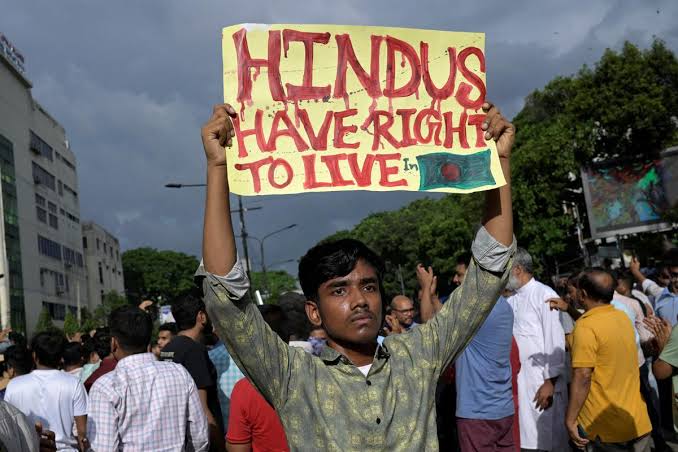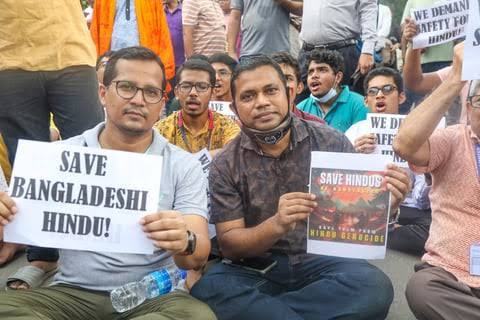Hindu lives do not matter to Yunu’s radicalized administration

Bangladesh, a country born through immense sacrifice and the blood of three million martyrs, now faces a grim reality that undermines its founding principles.
Once envisioned as a peaceful and inclusive nation, it is increasingly being portrayed on the global stage as a breeding ground for lawlessness and violence.
Muhammad Yunus, a so called Nobel laureate, has become a controversial figure domestically, with his radicalized regime accused of turning a blind eye to systematic oppression and targeted violence against the Hindu minority.
This descent into chaos and targeted oppression is steering Bangladesh towards being labelled a “violence porn nation”. India and the international community must not ignore these alarming developments.
In history, tyrants like Adolf Hitler, Aung San Suu Kyi (known as Butcher of Rohingyas) and Ibrahim Raisi (known as Butcher of Tehran) have been branded as butchers for their genocidal actions against specific communities.
Muhammad Yunus who heads an illegal Government, appears to be treading a similar path, with growing allegations of Hindu persecution under his administration.
While this comparison might seem stark, the targeted violence, systemic neglect, and the blatant denial for minority oppression paint a damning picture.

Hindus in Bangladesh are not only facing persecution but are being systematically marginalized, with their voices drowned in an environment of fear and repression.
Bangladesh’s independence was rooted in the promise of secularism and inclusivity.
However, the current state of lawlessness and targeted violence against Hindus shows how far the nation has strayed from these ideals. This is not the Bangladesh that freedom fighters envisioned.
The sacrifice of millions was for a nation that would respect the rights of all its citizens, irrespective of their religion or ethnicity.
As a defense analyst, I see a deeply troubling future for my country. Bangladesh, once a beacon of hope in South Asia, is now on the verge of chaos.
The defenders of law have become perpetrators of oppression. The Chattogram District Bar Association’s recent resolution exemplifies this decay.
The resolution declared that ISKCON, a global Hindu spiritual organization, is a “radical terrorist organization” without any state sanction or legal basis.
Such baseless accusations are a clear indicator of the lawlessness that has engulfed Bangladesh.
The resolution goes further, making absurd demands such as prosecuting ISKCON members for a lawyer’s murder and implicating Hindu leaders like Chinmoy Krishna Das in fabricated cases.
This move signals a targeted campaign to vilify and suppress Hindu voices. When an association of legal professionals endorses such resolutions, it signifies a complete breakdown of the rule of law.
Furthermore, Pakistan’s open admission of sending weapons to Bangladesh to “liberate it from Indian aggression” adds a dangerous dimension to the already volatile situation.
This statement not only exposes external interference but also highlights the vulnerability of Bangladesh’s sovereignty under the current regime.
The persecution of Hindus in Bangladesh is not a recent phenomenon, but it has intensified alarmingly under Yunus’s government.
The Chattogram Bar Association’s demands, such as seeking the death penalty for Hindus accused without evidence, reflect the institutionalized bias against the minority community.
How can justice prevail when even the legal fraternity becomes complicit in propagating hate and violence?
The branding of ISKCON as a terrorist organization by a lawyer’s group without any state endorsement is not only illegal but also a dangerous precedent. It demonstrates the unchecked power of radical elements within the system.
The Hindu community, already vulnerable, now faces even greater challenges as they are unjustly accused and targeted.
The persecution of Hindus in Bangladesh has far-reaching consequences for regional stability. South Asia, already a region fraught with communal tensions and geopolitical rivalries, cannot afford another crisis.
The systematic targeting of Hindus will exacerbate existing tensions between Bangladesh and India, which shares cultural, historical, and religious ties with the Bengali Hindu community.
India, as a neighboring country, has a moral obligation to protect the rights of Hindus in Bangladesh.
However, any intervention could be misinterpreted as aggression, further complicating bilateral relations.
Moreover, the persecution of Hindus undermines Bangladesh’s reputation as a moderate Muslim-majority nation and fuels the rise of extremism in the region. India acted in 1971 to save the Bengalis, now it must act to save the Hindus.
This instability could also embolden radical Islamist groups, creating a fertile ground for terrorism and cross-border militancy.
The implications for regional security are dire, as a destabilized Bangladesh would have ripple effects across South Asia, affecting economic growth, trade, and diplomatic relations.
The Hindu minority in Bangladesh cannot be saved without concerted international efforts. The silence of global leaders, human rights organizations, and media outlets is deafening.
The United Nations, the United States, and other influential actors must take a firm stand against the Yunus government’s complicity in Hindu persecution.
India along with rest of the international community must pressure the Bangladeshi government to ensure the safety and security of its Hindu citizens.
Targeted sanctions, diplomatic condemnations, and robust media coverage can bring global attention to this humanitarian crisis. People in South Asia are hoping that the chaos and violence will cease once the President-elect assumes office.
However, given how Yunus’s government is permitting the persecution of Hindus, it is possible that 200,000 Hindus may face persecution before then.
Bangladesh stands at a crossroads. It can either uphold the values of secularism and inclusivity that its independence was built upon or continue its descent into lawlessness and targeted oppression.
The Yunus government’s failure to protect its Hindu citizens is a betrayal of the nation’s founding principles.
The persecution of Hindus is not just a domestic issue but a threat to regional stability and global peace. India and the world must act now to prevent Bangladesh from becoming a breeding ground for extremism and injustice.
Hindus’ lives matter, and their safety must be a priority for both Bangladesh and the international community.
The time for complacency is over. The time for action is now. India must act.
Source : Blitz Bangladesh




